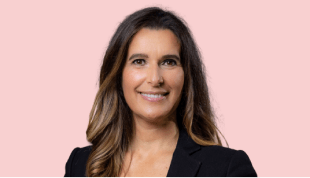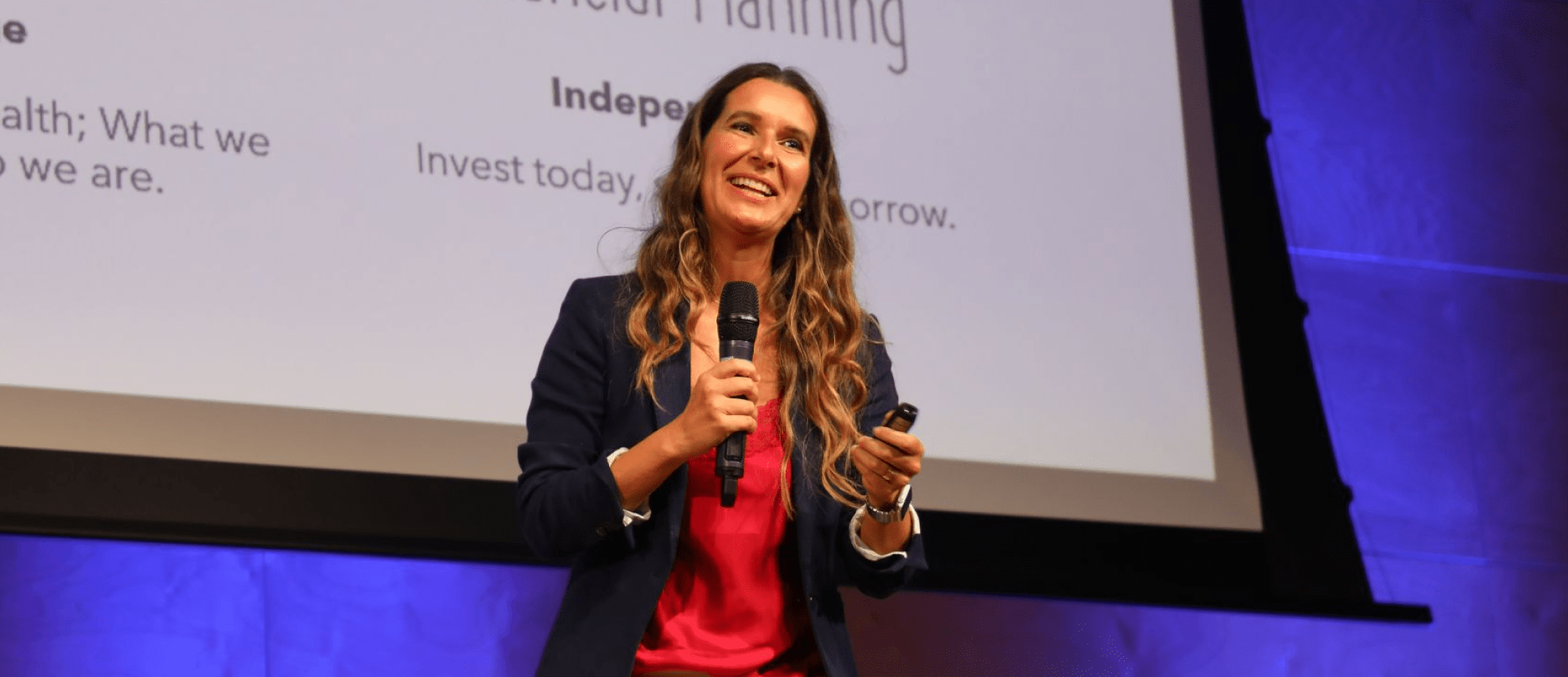Rita Piçarra had just gotten the keys to her first apartment when she decided to take a trip to the closest mall. As she was walking by the different aisles, she saw that there was a lot of commotion happening on the TV’s that were on display. A football match was being broadcasted, and it suddenly came to a halt as a Hungarian player collapsed, lifeless, on the pitch. Rita stood still, frozen in place and staring at all the TV’s as it all unfolded until the moment the sportscasters announced that the man hadn’t survived. That was the moment Rita, who was 25 at the time, realised her life had to change, somehow.
“I thought to myself: ‘this happened to an athlete, who has everything to be healthy, and I’m here working like crazy, with no time to go to the doctor. What if it happens to me?'”, Rita recalls. A few years later, the loss of both her parents made her rethink all her life choices yet again, and she made the decision to retire at 50. At 44, after being Microsoft Portugal’s CFO for 5 years, Rita quit her job in the corporate world. “I already had the financial independence I wanted, so I made the decision.”
Making the decision to leave the corporate world at an earlier stage in life is not new. The FIRE Movement — Financial Independence, Retire Early — has been around for over three decades, since authors Vicki Robin and Joe Dominguez used the term in their book, Your Money or Your Life, but its popularity has risen over the last few years, with more and more people planning on retiring earlier. According to Rita, the pandemic may have had an impact in this rise in the movement’s popularity.
“People began to realise the real value of time and that everything can change when you least expect it, so many began to consider what makes sense and what doesn’t, what they want for their life and their future”, the former CFO of Microsoft stated.
The FIRE movement popularity and Rita’s journey to achieving financial independence were just a few of the topics discussed during this interview. The importance of work-life balance, of growing within an organisation and why burnout can become a real problem for finance teams were also featured in this conversation.
From auditor at Deloitte to CFO at Microsoft Portugal
Let’s start at the beginning… Who is Rita Piçarra?
I was born in Lisbon, Portugal, and grew up in the suburbs with my family. During high school, when I was about 14 or 15, I had a class called Business Organisation Techniques and I liked it so much that the teacher suggested I go on to college to study auditing. “If you like accounting so much, maybe you should work in auditing”, he said at the time. “You work really hard, but you make a lot of money.”
I thought about how my parents always told me that it was important to have a job that would give me financial stability, that would guarantee I had a good future. So I thought to myself: “if I’m going to work hard but also earn a lot, why not?” And that was it.
“If people save and invest, they will be able to retire. If they don’t, then they will have to keep on working. It’s as simple as that.”

Rita Piçarra
Former CFO @ Microsoft Portugal
I was the first in my family to go to university. At the time, there was no internet like today, so I remember going to one of those fairs to find out which college to go to and which courses they had. I found out about ISCAL’s Auditing programme and decided to apply.
When I left ISCAL, I applied for a job at Deloitte. It was the start of my career as an auditor and I stayed there for about four years. I worked really hard, but I also learned a lot by dealing with the realities of all the different clients I was handling at the time.
What was the biggest challenge you faced during that time?
I’d say the biggest problem in this line of work is that we don’t have a lot of time. Neither for ourselves nor for our family. Back then I was single, and I didn’t even have time to find someone.
Is that when you had your first turning point?
Yes. I remember that I had just bought my first flat and was out buying a television. They were broadcasting a football match at the mall and Benfica was playing. That was the game where Miklos Fehér died [the Hungarian player suffered a cardiac arrest during a match in January 2004. He passed away on the field and it was broadcasted live]. That moment moved me. I thought “this happened to an athlete, who was healthy and in top shape, and I’m here working like crazy, with no time to go to the doctor. What if it happens to me?”
That’s when I began to rethink my choice of becoming an auditor and progressing my career. Shortly after, I was auditing Microsoft and the CFO at the time, who I already knew and had a good relationship with, thought I wasn’t looking like myself. I explained that things weren’t going as well as I had hoped and that I was considering leaving Deloitte. She told me then that Microsoft had a vacancy available that I could apply for, and I ended up being chosen for the job.

And how was your career at Microsoft?
Since I joined, I’ve had the opportunity to work around the world. I was in the United States, in Seattle, then I went to Paris, São Paulo, Miami and Madrid. Then, about five years ago, I returned to Portugal as the CFO of Microsoft Portugal.
Have you always had a goal?
All these roles I’ve held at Microsoft aligned with my career development plan. I had to grow within the organisation and acquire all the skills I needed so I could be ready to be a CFO, and I succeeded.
Do you think the growth you managed to achieve is possible in other sectors?
I think it doesn’t have so much to do with the sectors, but rather the company, whether or not it invests in their employees.
When I lived in Brazil, a tech company made me an offer and, at the time, I asked “but how long will I have to stay in this position before I progress and what is the international career progression like?”, to which they replied that they expected someone to stay at that same role for at least ten years before they could progress. So I think that more than the industry, it has to do with the company you work for, and that is something that younger generations need to consider.
The company’s values and mission are important, but it is also essential to look at the career growth opportunities one can have within the organisation. If they expect you to do the same thing for the rest of your life, maybe you won’t take it because you have ambition and you want to go a lot further, which won’t be possible in that company.
The road to retirement at 44
So what made you leave?
I lost both my parents whilst I was working abroad, and I was in Brazil when my mom fell ill, which made me, again, rethink my priorities and understand what I wanted out of my career and life.
I’ve always been very ambitious, always wanted to evolve and grow a lot in my career. But after losing my parents, I decided that my career would finish when I turned 50 years old. I’ve always wanted to achieve a lot of corporate goals, but I realised that life doesn’t always last as long as we expect it to, and we don’t always have enough time to do the things we want to.
I also started to think about the reality in Portugal a lot [in 2023, the legal age to qualify for a government-paid retirement pension is over 66], and I realised that if I had to wait that long, the same thing that happened to my parents, dying so young, could also happen to me. That only fuelled my decision to finish my career by 50.
But you ended up doing it early…
I’ve always been very open with my managers about my goal to retire at 50. But after five years, I got to a point where I thought “well, I’ve been doing this for a while, I’ve learned everything there is to learn about this, so I need to start looking for something new”. But for that, I would most likely need to leave the country again, and the reality was that my family wasn’t super open to the idea of moving again.
As I already had the financial independence I wanted, I made the decision to retire at the age of 44. I then spoke to my manager and HR team so we would come up with a strong succession plan for my departure.
“[During the pandemic] People began to realise the real value of time and that everything can change when you least expect it.”

Rita Piçarra
Former CFO @ Microsoft Portugal
You said in an interview that no matter how much work-life balance there is, there is always work. Wasn’t it possible to achieve enough work-life balance and also reach the goals you were seeking?
I’ve always been an advocate of work-life balance and managed to prioritise what I think it’s important to me. I’ve never given up picking my daughter up from school or stopped working out. I’ve never given up these priorities, which have always been very present in my life.
But it ends up being easier to make these choices when you’re in a senior position than when you’ve just joined a company. When you’ve just joined a company, you don’t feel empowered to make these kinds of choices and, if you do, people might think, “Look at that one, she’s not working hard enough”. When you’re a senior, you feel the opposite, you’re already mature enough to make those decisions, but you’re always thinking that you could be doing more, going further.
Were there sacrifices you had to make?
When I left Paris to go to Brazil, my mom was in Portugal with a terminal illness, under my sister’s care. How many people would make the decision to continue their career abroad?
I do think there are a lot of sacrifices you have to make, and this one was probably the hardest. Just thinking that my mother was at the final stages of her life and I was two flights away from home still tears me apart. These are the things that stay with you for the rest of your life.
And then there’s the little things that you keep in the back of your mind. How many times did I get home and my daughter was fast asleep? Or I missed parents’ meetings at school and got the side eye from other parents whenever they had to bring cake and hers’ was store bought? For those other parents, I was setting a bad example for my child.
Do you regret anything?
Honestly? No. There are things that still make me a bit sad, but the truth is that I wouldn’t change anything in my life, because that’s what brought me to where I am today.
I’m happy with my life and fulfilled with everything I have achieved. I would do it all over again, and although some choices were difficult, they brought me to the right place. We often make wrong decisions, but they teach us something for the future, so we know how to do things differently the next time around.
Was returning to Portugal always a part of the plan?
Yes. Portugal is a fantastic country, even with all its flaws. I never let my foreign friends speak badly about my country.
We, the Portuguese, complain a lot, but we have things that others don’t have. My daughter sprained her ankle on a playground in the United States, and we had to wait for three hours at the hospital for an X-ray, just to receive a bill for 1300$, and that’s after insurance. In Portugal, the public health system covers this expense. It’s not excellent, but it’s praiseworthy when compared to other countries.
Recent studies point to the fact that financial teams are under a lot of pressure and suffering from burnout. Do you think this will lead more people in finance to retire earlier?
If people save and invest, they will be able to retire. If they don’t, then they will have to keep on working. It’s as simple as that. But what I think is important, nowadays, is that all these topics around burnout and mental health are still not being discussed enough.
Most people don’t even realise they’re close to a breakdown and they keep on working, which is scary. They can reach a state where they’re unable to perform their duties, without understanding why that’s happening. But the most dangerous thing about all this is that more often than not people don’t seek help, as it’s still seen as a weakness.
Is this more common in finance?
It hits Finance people more because they’re often perfectionists. We all like numbers, things that are right, exact and immaculate. I used to joke and say that if there was a problem to solve, then go talk to someone from finance because they would know the right answer. When no one else knew how to solve a problem, Finance would.
This is the profile of a finance person. Everything has to be right and nothing can fail. It’s about making sure that things go well and everything runs smoothly. That sort of pressure makes people more vulnerable and more likely to burnout, because they won’t allow themselves to let anything fall through the cracks.
FIRE Movement & Reaching Financial Independence
The FIRE movement and financial independence is not a new concept. In fact it’s over three decades old. But we’re only now starting to hear more about it. Why do you think that is?
I have two theories. The first is that we’re in Portugal, which means that trends take a little longer to settle in the country. This used to happen with so many other things, such as films or books. We still see it happen with other trends today.
When I lived in the United States it was very common, especially in Miami, to see relatively young people who had left their career sooner than expected. My husband and I were even nicknamed “that working couple” by our neighbours. This wasn’t the case in Portugal, and it’s possible that the trend may have taken a while to cross the ocean.
On the other hand, I believe the pandemic led many people to rethink their lives. People began to realise the real value of time and that everything can change when you least expect it, so many began to consider what makes sense and what doesn’t, what they want for their life and their future.
Did the current state of the market, where uncertainty reigns, have any impact on your decision or make you have any second thoughts?
It didn’t affect me that much because, for me, it was a personal decision. I realise that nowadays, with the current market, people look at my example and think they can’t do it. And maybe they’re right, especially with the current state of the economy and the tax pressure in Portugal. It’s much more difficult to leave the workforce today than when I started planning my exit.
And a lot of people ask: “So what’s the solution for me?”, and maybe it could be to move abroad, where the salary could double or triple. But I’m also aware of the reality and know that not everyone is able or willing to leave everything behind and go in search of the unknown.
Is there a minimum amount of money you need to guarantee before you make the decision?
The FIRE movement has some very specific rules regarding financial independence and savings. That’s why I don’t really like to say that I joined the movement, because I don’t really follow these rules.
I’ve always guided myself according to the education my parents gave me, so the idea of spending without creating additional income has always caused some anxiety. And, truth be told, I didn’t leave the corporate world so I could remain anxious, rather the opposite.
For me, the main rule has always been to have a stable source of income apart from the one a third-party organisation could provide. An amount that would allow me to cover my fixed costs — such as food and other necessities —, some variables and also to have some margin to continue saving or investing. So what I did was a plan to understand what my fixed monthly costs were, what those little luxuries I wouldn’t want to give up on were, and then how much I wanted to set aside every month in case of an unforeseen circumstance or to invest. In the end, I multiplied that amount for one year.
After learning what those costs were, I realised I had to have an income to guarantee those funds and, for that, I did some investments in stock and, mostly, in real estate. It was a matter of personal preference for me, and it allows for more freedom, without having to depend on the stock market.

But how do you get into that mindset?
For me it was a life decision, so that I could enjoy my life for longer. To do that, I had to plan, and planning means above all having a minimalist life, without big luxuries and big expenses.
I had to make that choice. I’m often asked what car I drive. I have an electric Smart car. But, truth be told, I could have taken out a loan or even sold some shares to buy any other car, but that was never my goal in life. My goal has always been to have enough money so I could be happy, not to show others what I have. Although in Portugal we live in a country of a lot of appearances.
And that isn’t the case elsewhere…
When I got to Miami I felt like I was living the American Dream, where everyone drives around in convertibles. And that’s the dream, isn’t it? To have a convertible. So I bought a second-hand one.
But then I looked at my boss and he had some cheap basic car from a brand I didn’t even know. One day I asked him why he was driving that car and he said “because it’s cheap and it gets me from point A to point B”.
In other words, you have to live a minimalist life, without great luxuries, that’s the only way to achieve certain goals. And that’s not to say that other options are wrong, this was just the one I decided on.
One of the things you talked about in previous interviews was how you’ve made investments in real estate and stock shares to get the income you needed. But where, exactly, do you start?
The most important step is to save money. But apart from that, the first step is to grow within an organisation that you truly believe in, progress in your career and have a good salary so you’re able to save. You need to be an excellent professional to achieve this.
You can also have some hobbies and side jobs that will allow for some extra income and provide some experience. And this doesn’t necessarily mean you need to have a higher education degree or specific training. Sometimes, it can be leaving a job as a doctor or engineer behind to embrace a career that, in the eyes of society, can be considered as a lower status, but that really makes you happy and allows you to get a good income so you can save.
“The idea of spending without creating additional income has always caused some anxiety. And I didn’t leave the corporate world so I would remain anxious.”

Rita Piçarra
Former CFO @ Microsoft Portugal
After getting that income, you should pay off all your loans, especially the ones that have really high interest rates. From then on, living a minimalist lifestyle without falling back into the credit rabbit hole would be the way to go.
You should then start working on an emergency fund, in case something happens, and start investing. And investing isn’t the same for everyone. In my case, I bought property at a time where the housing market was quite different from what it is today. Houses were much cheaper at the time. You can also make higher risk investments like the stock market, although if you’re looking for some guidance, it would be best to seek the help of a specialist.
Are things different for younger generations?
It’s completely different from when I started my career. It’s very common in Portugal for people to ask children what they want to be when they grow up at the age of four or five, to which they respond with jobs they know: doctor, lawyer, astronaut or fireman.
When we’re 14 or 15, it’s different. We’re embarking on the path that will lead us to university. And when you go into economics, for example, you have a range of options. But nowadays, nobody asks themselves what they want to be. Today, we know that there isn’t just one job, but hundreds that could fit our profile. Today, people are studying one thing and they will most likely end up following a completely different path.
Gen Z’s and Millennials have different perspectives now, they change their careers often. Do you think they will be able to retire early as well?
I think so. Just a few days ago I saw someone in their 30s posting on LinkedIn that they had also retired. So I think yes, it’s possible, but I also know that things have changed.
The careers that exist today won’t exist in a few years’ time, so we should focus much more on acquiring skills and not so much on having this or that job title. CMOs and CFOs will still be there, but the focus should be on competences. Strategic thinking, for instance, is something that can be leveraged in various areas of an organisation, from marketing to sales and, of course, Finance. There is so much reorganisation in companies today that holding on to a title or a role can be uncomfortable.
Can people, in today’s uncertain environment, achieve FIRE? I think so, because the strategy is always the same. A good employee can climb the corporate ladder, earn more and save a significant part of their salary. A good worker will always be seen as such, and there will always be opportunities for growth. But in order to make this decision, you also have to have your head in the game and focus on it.
Life after retirement
The idea of retiring earlier isn’t very common in Portugal or, if it is, it isn’t talked about. Why do you think that is?
To begin with, it’s important to clarify that I haven’t actually retired, because retirement in Portugal means receiving a pension paid by the state, which is not the case for me. And I think there are already a few other people doing this, but it’s not talked about much because there’s a lot of prejudice around it.
When a person decides to pull back from their career, there’s a psychological part that isn’t talked about. If a person has been CFO of Microsoft or a Professor of Engineering, there is a status associated with their name that is difficult to give up on. People become their jobs. And what happens when they give up what they do? It’s harder than it might seem.
I was recently talking to a 70-year-old professor who told me he couldn’t stop teaching. “Teaching is all I have in life,” he told me. How do you give up on what you consider to be your life?
Is there a process behind it?
You have to go through a second phase. In my case, I had to get some psychological help to be able to disassociate the two things. I didn’t stop being that person. I was the CFO of Microsoft Portugal between 2018 and 2023, but I don’t need that position to be who I am today.
This is still a complex subject, especially in Portugal, where any conversation around mental health issues is still frowned upon, just like money talk.
Can we consider it to be a kind of reverse burnout?
I think people feel a lack of direction and purpose in life. It’s funny because when I announced I was leaving I got two reactions: on the one hand, a certain envy, people asking me “but how can I do it like you did?”, and on the other, people asking me if I was mad and “what are you going to do with so much time?”.
Those are the people who don’t have a defined purpose for the after-work-life. I knew what I wanted, to commit to doing things that I really enjoyed but never had the time for. But if you’re completely passionate about teaching, how do you change that chip?
In my case, although I really enjoyed being a finance director, I somehow managed to close that loop and realise that my purpose was fulfilled. I wanted to help other people do it and do other things with my time.
“The careers that exist today won’t exist in a few years’ time, and even though CMOs and CFOs will still be there, their focus should be on competences.”

Rita Piçarra
Former CFO @ Microsoft Portugal
You left the corporate world. But is it retirement, or something else?
The designation of retirement in Portugal implies receiving a pension paid by the state, which I don’t, because I can’t. So, in fact, it’s not really retirement in the real sense of the word.
On the other hand, I want to stay active and continue to work, but without depending on others. I want to do things that bring me positive energy and make me feel passionate. I also want to have time for myself, to control my own schedule. So it’s not exactly retirement.
I’ve left the corporate world, I have other income that doesn’t depend on a third party company, and I bought time for myself, to do what I like. I’m writing a book about financial literacy, which is one of the things I want to do, help others understand how I got here and how they can do it at their own pace. I want to continue doing interviews, participating in events and dedicating time to helping others who also feel they need to make some kind of change in their lives.

Psychologically, can you call this work?
In my head, it’s helping people. It’s sharing my story to inspire others to do the same. It may not be exactly how I did it, because things have changed a lot since I started my career, but I want to inspire others to be more financially literate and make their own choices, to focus on developing their career and their ambitions.
Do you feel retired yet?
It’s funny because I hadn’t planned for the media buzz I got after the interview with Expresso [Expresso is one of the biggest newspapers in Portugal. Rita was interviewed for one of their podcasts]. I had a corporate plan and then I had a personal one: to write my book, teach at a university and do other things.
Suddenly, the interview blew up and I realised that people started recognising me on the street, and all this buzz around my story hasn’t allowed me to slow down the way I wanted to yet.
Right now, I feel like I’m riding a unicycle with my computer on one hand and my phone on the other, responding to all of these requests, writing a book, organising a calendar. I understand that people want to talk to me, and I want to talk to them, to help in any way I can, but this mediatic wave has been a tsunami. Now I want to find smaller waves, to enjoy the ride and have fun in this second life I have chosen.




